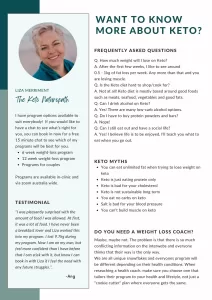Curious about how your diet can influence your mental health? Discover the benefits of a therapeutic ketogenic diet for depression and anxiety. We’ll delve into the science behind the diet, its potential mental health benefits, and practical tips for incorporating it into your lifestyle.
What is the Ketogenic Diet?
Before diving into its mental health benefits, let’s quickly review what the ketogenic diet (keto) entails. The keto diet is a higher-fat, low-carbohydrate diet designed to shift the body’s metabolism from relying on glucose (sugar) for energy to burning fats instead. This metabolic state, known as ketosis, results in the production of ketones, which are used as an alternative energy source.
The Science Behind the Ketogenic Diet for Depression and Anxiety
How Ketosis Affects the Brain
When the body enters ketosis, it produces ketones, primarily beta-hydroxybutyrate (BHB), which has been shown to have neuroprotective effects. BHB can cross the blood-brain barrier and provide a stable source of energy for brain cells, potentially enhancing brain function and reducing oxidative stress and inflammation, both of which are linked to depression and anxiety.
Balancing Neurotransmitters
One theory suggests that the keto diet may help balance neurotransmitters, particularly gamma-aminobutyric acid (GABA) and glutamate. GABA is an inhibitory neurotransmitter that promotes calmness and relaxation, while glutamate is an excitatory neurotransmitter. An imbalance between these two can contribute to anxiety and depression. The ketogenic diet has been shown to increase GABA levels, which might help alleviate symptoms of these mental health conditions.
Evidence from Research
Studies on Depression
Several studies have investigated the keto diet’s effects on depression. A study published in the journal “Nutritional Neuroscience” found that rats on a ketogenic diet exhibited reduced depressive-like behavior compared to those on a standard diet. Additionally, human studies, although limited, suggest that individuals with mood disorders who follow a ketogenic diet report significant improvements in their symptoms.
Studies on Anxiety
Research on anxiety and the ketogenic diet is still emerging, but early findings are promising. A study in the “European Journal of Clinical Nutrition” found that mice on a ketogenic diet exhibited reduced anxiety-like behavior. While more human studies are needed, anecdotal evidence from those with anxiety disorders who have tried the keto diet indicates improvements in anxiety symptoms.
Practical Tips for Starting a Therapeutic Ketogenic Diet
Consult with a Healthcare Professional
Before starting any new diet, it’s a good idea to consult with a healthcare professional who specialises in Ketogenic Diets, particularly if you have pre-existing health conditions or are taking medication.
Focus on Whole Foods
For the best results, base your ketogenic diet on whole, unprocessed foods. This includes high-quality fats like avocado, olive oil, and nuts; protein sources such as meat, fish, and eggs; and low-carb vegetables like leafy greens, broccoli, and cauliflower.
You can download my FREE Keto-Mediterranean recipe book here.
Stay Hydrated and Maintain Electrolyte Balance
The keto diet can lead to a rapid loss of water and electrolytes, especially during the initial phase. Ensure you stay hydrated and consider supplementing with electrolytes like sodium, potassium, and magnesium to prevent side effects such as the “keto flu.”
Monitor Your Progress
Keep track of your mental health symptoms and overall wellbeing as you transition to a ketogenic diet. Journaling your experiences can help you and your healthcare provider assess the diet’s effectiveness and make necessary adjustments.
Potential Challenges and How to Overcome Them
The Initial Adjustment Period
Many people experience what’s known as the “keto flu” during the first few weeks of the diet. Symptoms can include fatigue, headache, and irritability. To mitigate these effects, gradually reduce your carb intake before fully committing to the diet, and ensure you’re staying hydrated and maintaining electrolyte balance.
Social and Lifestyle Adjustments
Adopting a ketogenic diet can require significant changes to your eating habits and social interactions. Meal prepping, finding keto-friendly restaurants, and explaining your dietary choices to friends and family can help ease the transition.
FAQs
Can the ketogenic diet replace medication for depression and anxiety?
While the keto diet can support mental health, it should not replace prescribed medications without a healthcare provider’s guidance. Always consult with your doctor before making any changes to your treatment plan.
How long does it take to see mental health benefits from the ketogenic diet?
Individual responses vary, but some people report noticing improvements in mood and anxiety within a few weeks. Consistency and adherence to the diet are key factors.
For more FAQ’s on the Ketogenic diet, download my FREE PDF
The therapeutic ketogenic diet offers a promising avenue for managing depression and anxiety. By shifting your body’s metabolism and balancing neurotransmitters, the keto diet can potentially enhance your mental health. As always, consult with a healthcare professional before making significant dietary changes and monitor your progress to ensure the best results. Ready to give it a try? With the right approach and support, you might find that the keto diet provides the mental health boost you’ve been looking for.
Check out my other blog posts here for more Australian keto articles.



